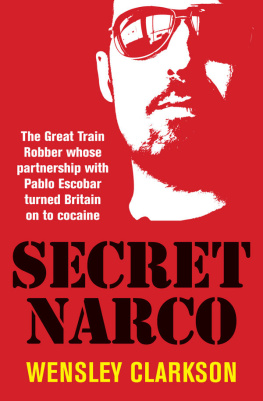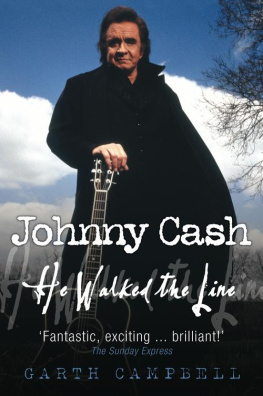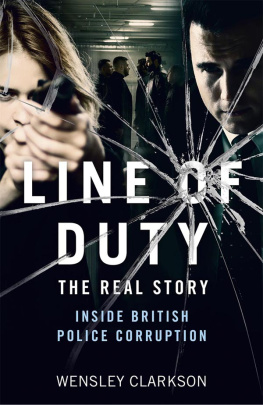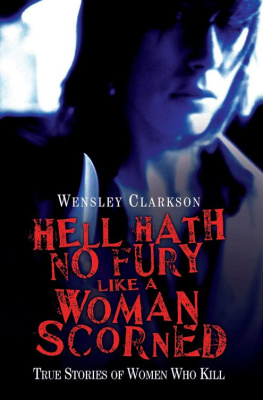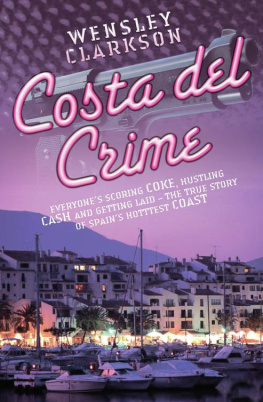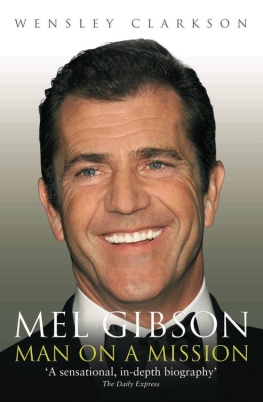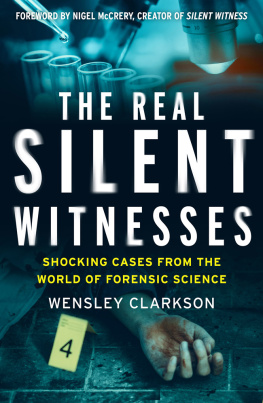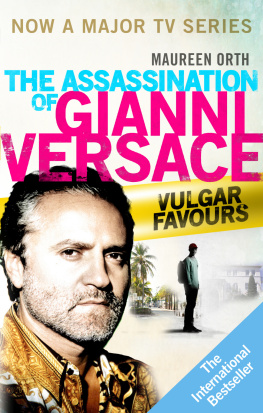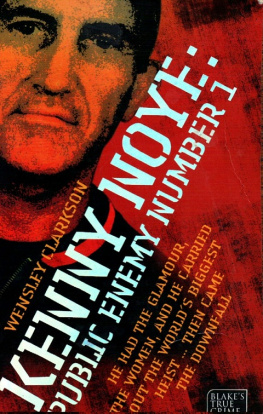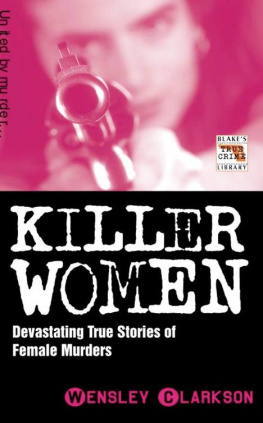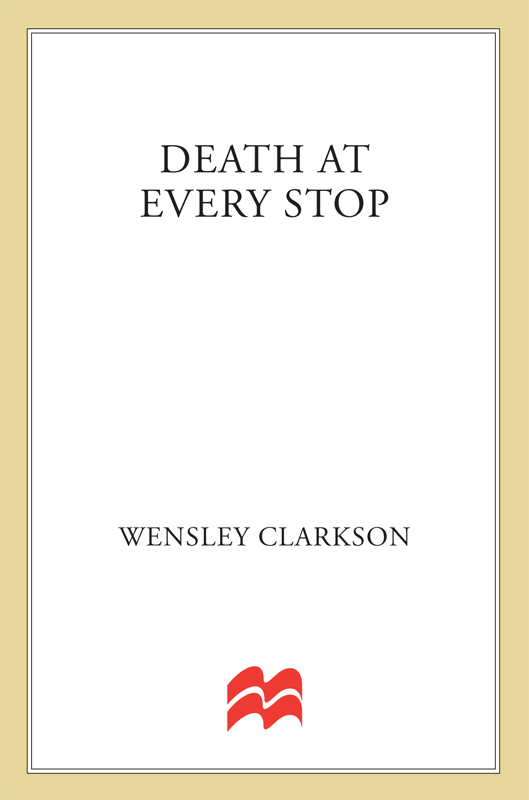
The author and publisher have provided this e-book to you for your personal use only. You may not make this e-book publicly available in any way. Copyright infringement is against the law. If you believe the copy of this e-book you are reading infringes on the authors copyright, please notify the publisher at: us.macmillanusa.com/piracy.
Contents
Dear Reader:
The book you are about to read is the latest bestseller from St. Martins True Crime Library, the imprint The New York Times calls the leader in true crime! Each month, we offer you a fascinating account of the latest, most sensational crime that has captured the national attention. The Milwaukee Murders delves into the twisted world of Jeffrey Dahmer, one of the most savage serial killers of our time; Death of a Little Princess details the tragic story of little JonBent Ramsey; Lethal Lolita gives you the real scoop on the deadly love affair between Amy Fisher and Joey Buttafuoco; Whoever Fights Monsters takes you inside the special FBI team that tracks serial killers; Unanswered Cries is the story of a detective who tracked a killer for a year, only to discover it was someone he knew and trusted; Bad Blood is the story of the notorious Menendez brothers and their sensational trials; Sins of the Mother details the sad account of Susan Smith and her two drowned children; Fallen Hero details the riveting tragedy of O. J. Simpson and the case that stunned a nation.
St. Martins True Crime Library gives you the stories behind the headlines. Our authors take you right to the scene of the crime and into the minds of the most notorious murderers to show you what really makes them tick. St. Martins True Crime Library paperbacks are better than the most terrifying thriller, because its all true! The next time you want a crackling good read, make sure its got the St. Martins True Crime Library logo on the spineyoull be up all night!

Charles E. Spicer, Jr.
Senior Editor, St. Martins True Crime Library
There were dozens of photographs and wreaths to indicate the position on the coral-pink steps of his Miami Beach house where fashion legend Gianni Versace met his untimely death. His blood stains and police chalk marks where the bullet cases fell remained untouched for some hours.
As crowds formed outside the mansion to mourn their slain idol, one man ripped Versace ads from a magazine and daubed them in the designers blood, as a keepsake.
Among the heartbroken fans there was a young dark-haired man in his mid-twenties watching avidly. He seemed to be smiling. Why?
Perhaps it was because the death of Gianni Versace had done more than shock the worldit had catapulted that man, Andrew Phillip Cunanan, into the history books as one of the most dangerous killers of the twentieth century.
For Polly and Rosie
NOTES OF GRATITUDE
The idea of using a leaden, dispassionate word like acknowledgments for this section cannot begin to express the depth of my feelings for the many individuals who have made this book possible. I owe them my deepest and most heartfelt gratitude.
First to my literary manager Peter Miller and my editor Charles Spicer. Without them this book would never have happened. Their support and guidance have been very much appreciated. Also, many, many thanks to Uri, David, and Michelle and the rest of the team at PMA. Also, Peter Wilson, who first brought this case to my attention and whose investigative skills have proved so invaluable in helping me put this book together.
In San Diego and San Francisco numerous friends and associates of Andrew Cunanan helped enormously despite fears for their own safety. Many of them asked that their names be kept confidential. I have respected their wishes and therefore cannot thank them by name.
Then there is my worldwide network of Brendan Bourne, Anthony Bowman and Mark Sandelson in California, John Glatt in New York, Jack Green in Minneapolis, Tony Benwell in Chicago. Also the FBI and police departments of all the cities mentioned in this book. And John Taylor in London.
But one of my biggest debts of gratitude goes to the many friends and colleagues who kept me constantly updated so as to make this book the most up-to-the-minute version of events.
Aprs moi, le dluge After me, disaster
The caption Andrew Cunanan chose for his high school yearbook.
AUTHORS NOTE
Andrew Cunanan, the man whose life is described in this book, fits the commonly used definition of a spree killer because he was engaged full-time in the business of killing one person after another.
Spree killers are a type of serial killer who are involved on a full-time basis in their killings and in running from the law, says James Alan Fox, dean of the college of criminal justice at Northeastern University.
Ordinary serial killers, by contrast, says Professor Fox, may have jobs and families and take time out between their murders.
Some experts believe that a spree or serial killer must claim three victims before being given the appellation, but Professor Fox believes that four is a more accurate figure.
Cunanan was forever inventing fictional personas for himself. I have pieced together the story of his life in part from what he told friends about himself and his family. But how much was reality and how much was his invention is, of course, difficult to know. But fact or fantasy, it all is essential to understanding who Cunanan was.

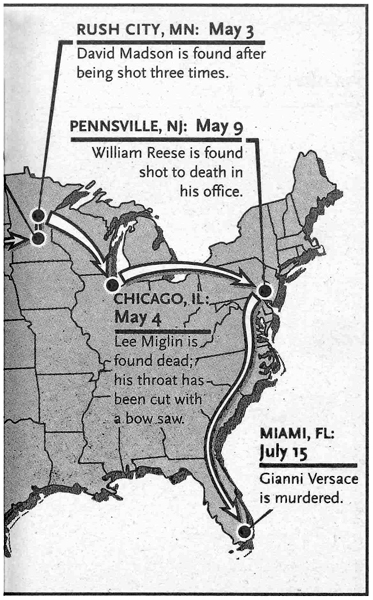
Prologue
Sliding across the rainbow from erotic pink to lizard green, the Art Deco structures on Ocean Drive, Miami Beach, were built to uplift the spirits of Americans and offer a distraction from the Great Depression.
Over sixty years later, they had helped turn the beach area into a gaudy, head-turning district filled with eye-candy buildings. Tacky, faddish, and full of showgirl simplicity. They also helped Ocean earn the local nickname of Deco Drive.
Only fifteen years earlier, this area was better known for its derelict buildings, prostitutes, and cocaine dealers. Today, its South Beach, the deco darling of the world and a mecca for the areas vast gay population.
Throngs of bronzed and beautiful people filled the district. They rollerbladed and strolled past the tables of places like the popular News Cafe, on Ocean Drive, along the sidewalks through the early morning traffic, beneath the palm trees, the wedding-cake deco hotels, and a sparkling golden Miami sun.
The News Cafe, favorite haunt of the fashionable and beautiful, is on the beachside boulevard that Miamis rich and successful residents helped turn from a rundown, sleazy oceanfront into an American Riviera.
Ten years ago, this was Skid-Row-sur-Mer, and the main businesses were single shots of cocaine and hard liquor. Now it is transformed. Grunge never made it here, nor did the fear of skin cancer; there is little suntan lotion below the factor six on sale.
The arrival of celebrities like Madonna, Sylvester Stallone, and a galaxy of others confirmed the revival of Miami Beach to its glory days of the Roaring Twenties, when the police department had to put up boards on the sand to remind the bathing belles: Warning: Law Requires Full Bathing Suit.


